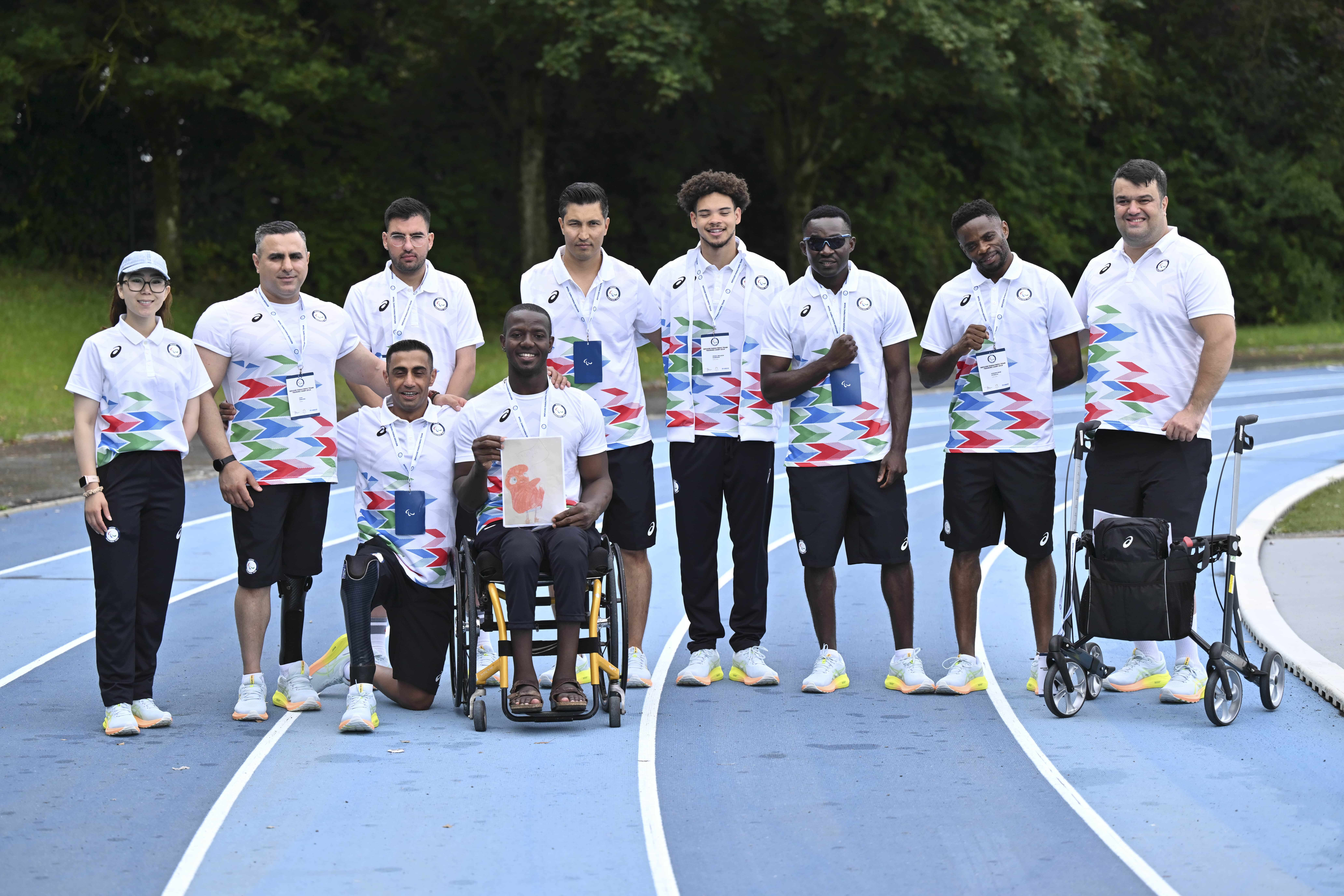Refugee Paralympic Team set to shine in Paris as final countdown begins
Refugee Paralympic Team set to shine in Paris as final countdown begins

The eight-member Refugee Paralympic Team and two guide runners gather at a training camp in Reims, France.
With three days to go until the Paris 2024 Paralympic Games, the International Paralympic Committee (IPC) announced today that T11 Para athletics sprinter Guillaume Junior Atangana will be the Refugee Paralympic Team’s flagbearer at Wednesday’s Opening Ceremony.
Representing more than 120 million forcibly displaced people worldwide, the eight athletes and two guide runners form the largest Refugee Paralympic Team (RPT) ever, after the team made its debut at the Rio 2016 Paralympics with two athletes.
The RPT will take centre stage, marching along the Champs-Élysées into Paris’ iconic Place de la Concorde. Speaking on his selection as the team’s flagbearer, Atangana said: “I am very moved and happy. It gives me shivers. I can already picture it in my head. I see myself as a big champion, the one who made his dreams come true." Atangana will be carrying the Paralympic flag alongside his running guide and fellow refugee, Donard Ndim Nyamjua.
Atangana thought his dreams of being a great sportsman were over when he lost his eyesight as a child., but he turned to Para athletics and sprinting. He finished fourth in the 400m T11 at the Tokyo 2020 Paralympics, just missing out on a medal.
The eight refugee athletes are hosted in six countries and will compete across six sports – Para athletics, Para powerlifting, Para table tennis, Para taekwondo, Para triathlon, and wheelchair fencing.
The first RPT member to compete on day one will be Para taekwondo star Zakia Khudadadi, the European champion in 2023 in the 47kg division. Khudadadi is an advocate for the rights of women around the world and made headlines after a harrowing escape from her country just days before Tokyo 2020. This is the third time the Refugee Paralympic Team will compete at the Games. Despite being forced to flee their homes and facing huge obstacles, the team members persisted and kept their dreams alive, securing a place at the Games in Paris.
Andrew Parsons, President of the International Paralympic Committee, delivered the news to Atangana personally in a video call at the team’s training camp in Reims, France. “You were chosen because of your history, the athlete you are. You are an important example to other refugee athletes and other athletes from different parts of the world that been through what you’ve been through,” said Parsons.
“This Refugee Paralympic Team is one of the great stories of the Paris 2024 Paralympics. Each of these athletes has overcome tremendous odds to get here and has a compelling message to share with the world. They are all great sports champions.”
Globally, it is estimated that at least 18 million people with disabilities have been forcibly displaced from their homes, as a result of war, conflict, violence and human rights violations. Many face higher risks of violence, discrimination, exploitation and abuse, and barriers in accessing critical support, assistance, education, sporting and livelihood opportunities.
“The Refugee Paralympic Team is an inspiration to us all. These incredible athletes have overcome unimaginable adversity to achieve the highest pinnacle of sporting success,” said Filippo Grandi, the UN High Commissioner for Refugees. “Their presence on the global stage sends a message of hope to millions of refugees across the world, and indeed to all of us. This remarkable team reminds us of how important it is for people with disabilities to have the chance to fully participate in society on an equal basis.”
Notes to editors:
UNHCR, the UN Refugee Agency, is partnering with the International Paralympic Committee (IPC), the International Olympic Committee and the Olympic Refuge Foundation to support refugees at the Games in Paris.
At the Paris 2024 Paralympic Games, the refugee team will be represented by a record eight athletes. The first Refugee Paralympic Team comprised of two refugee athletes and competed at the Rio 2016 Paralympics Games. The team grew to six for Tokyo 2020.
For more information please contact:
- In Paris: Paula Barrachina Esteban, barrachi@unhcr.org, +33 6 23 16 11 78
- In Geneva: Mel Paramasivan, paramasi@unhcr.org, +41 79 526 59 48

